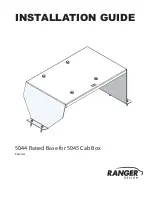
R
Map
: Using the map to enter a destination
(
Y
page 109)
i
In this case, using the map for destination
entry is based on the city seen in the
address input menu.
R
POI
: Entering a point of interest
(
Y
page 111)
i
In this case, entering a POI is based on the
city seen in the address input menu.
R
Save
: Saving a destination in the
destination memory (
Y
page 132)
R
Start
: Starting the route calculation
(
Y
page 107)
X
Continuing or completing destination
entry: Select one of the menu items
mentioned above.
Starting the route calculation
i
You cannot start the route calculation
until all the necessary address data has
been entered.
X
After entering the destination, select
Start
.
The route calculation will start if route
guidance has not already been activated.
If route guidance has already been
activated, a prompt will appear asking
whether you want to end the current route
guidance.
X
Select
Yes
or
No
.
If you select
Yes
, COMAND will stop the
route guidance and start the route
calculation for the new destination.
If you select
No
, COMAND will continue
with the active route guidance.
The new destination is discarded.
During the route calculation, an arrow will
indicate the direction to the destination.
Below this, you will see the message
The
route is being calculated...
.
Once the route has been calculated, route
guidance begins (
Y
page 116).
i
Route calculation requires time. The time
depends on factors such as the distance
from the destination.
COMAND calculates the route using the
digital map data. The calculated route may
differ from the actual road situation, e.g.
due to road construction or incomplete
map data. Please make sure that you
observe the notes about the digital map
(
Y
page 83).
i
Routes to destinations that do not have
road or ferry access to the current position.
This applies, for example, to routes from
the mainland to Hawaii.
Entering a destination from the
destination memory
X
Select
Navi
Q
Destination
Q
From
Memory
.
The destination memory list appears either
with or without the predictive speller
(
Y
page 108). Whether the predictive
speller appears depends on the number of
entries in the destination memory.
i
The destination memory always contains
an entry called
My Address
. You can save
your home address, for example, under this
entry (
Y
page 130).
Destination memory list with
predictive speller
COMAND navigation system (entering a destination)
107
Control systems
216_AKB; 3; 90, en-US
d2ureepe,
Version: 2.11.8.1
2009-05-15T11:47:50+02:00 - Seite 107
Z
















































